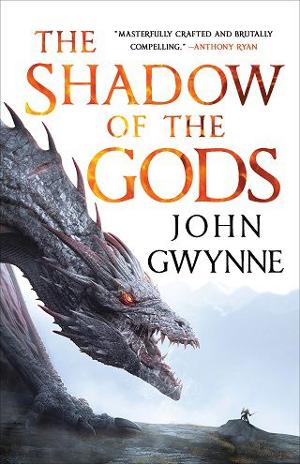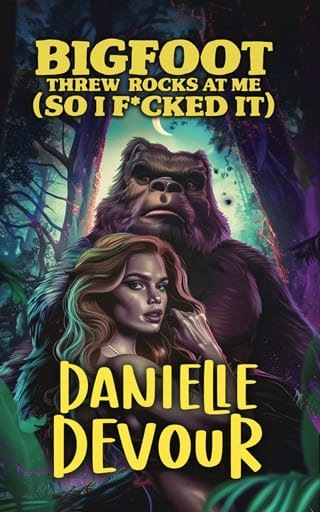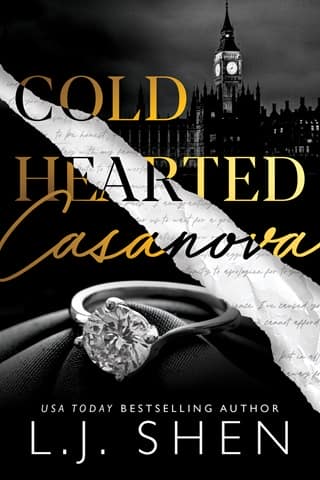Chapter Forty-Four: Elvar
CHAPTER FORTY-FOUR
ELVAR
Elvar walked through a land of mist-shrouded vales and rolling hills freckled with woodland. Ash, elm, oak and linden grew in swathes and copses. Streams gurgled, crows squawked in branches and at night wolves howled and foxes screeched.
And these are the Dark-of-Moon Hills, sung of by skálds throughout the land for three hundred years.
They are no different from the land south of the Boneback Mountains.
Except that humanity does not exist, here. They had passed a pile of troll dung once, a bull marking the boundaries of his territory, but other than that they had seen little evidence of vaesen, either.
Elvar felt a little disappointed.
“What’s wrong?” Grend grunted beside her.
He had woken almost two days ago, and now it seemed that he had never been injured, if not for the hint of a bandage visible beneath his iron helm and the scrapes and scratches all over his body. All of the Battle-Grim wore their full battle gear, even for marching, the lesson of the tennúr hill at the bridge still vivid in all of their minds. Elvar’s iron helm was buckled at her belt, a weight on her hip.
“I thought there would be more… danger,” she said.
“Be careful what you wish for, Elvar Fire-Fist,” Biórr said with a smile, who was walking close to her. He was never far from her, now.
“I know, you’re right,” Elvar said, smiling at the young warrior.
Grend gave Biórr a dour look.
Elvar had taken Biórr to her bed each night since the willow tree and made no secret of it. Grend had refrained from commenting, but the fact that he could have uttered the words Biórr had just spoken, and yet only scowled at the young warrior, showed that he did not approve of Elvar’s choice.
Their column halted, Agnar hidden from view as he led them, somewhere up ahead, with Uspa, Sighvat and the Hundur-thrall. They were following a winding track up a ridge, slow going with their carts. Elvar looked around and frowned. It was not an obvious place to make camp, and they had not been marching long enough to stop now, anyway.
“I’m going to see what is wrong,” Elvar said with a frown. Grend followed her, which was no surprise.
They strode along the column, past wagons and horses and the Battle-Grim, warriors staring into the woods around them, other shadowed figures scattered among the trees, scouts of the Battle-Grim. An air of excitement and anticipation hovered over them all, sharpening their senses. Elvar could almost feel it tingling in the air and prickling her skin, like before a thunderstorm.
The prospect of Oskutreð. It feels so close, I can almost smell it, taste it, hear its whispered call in the wind.
The front of the column came into view, Agnar standing upon the driving bench of a wagon. He was staring back along the column, over Elvar’s head.
“What is it?” Elvar asked as she drew near.
Sighvat shrugged. “Chief thought he saw something,” he said. The Hundur-thrall was sitting with his back against a tree, Uspa stood beside him. Her expression was drawn and stark compared to the warriors around her. Her hand absently patted the Hundur-thrall’s shoulder, like a faithful hound.
Elvar put a foot on the cart’s wheel and climbed up beside Agnar. He was staring back over the hills and woodland, a hand over his eyes against the glare of the sun in a cloudless sky. Elvar followed his line of sight. Back along the path they had taken, a patchwork of woodland, streams glistening among them like silver wire. In the distance were black specks of crows in the sky, silhouetted by Eldrafell’s red-veined glow, far to the west.
“What is it, chief?” Elvar breathed. She could feel his tension.
Agnar was silent a while longer.
“Nothing,” he eventually breathed, dropping the hand from his eyes and looking at her. “Just a feeling.” He sighed, turned and looked at Uspa.
“How much longer?” he asked her.
“Soon,” she shrugged.
“You have been saying that for two days,” Agnar growled.
“That is all I can say,” Uspa said. “The Graskinna was a Galdrabok, not a map.”
“Fine,” Agnar grunted. He patted the shoulder of the man in the driving seat of the cart, then leaped down to the ground.
“Onwards,” he shouted.
Elvar traced a finger across Biórr’s shoulder as she lay beside him, following the curl of a blue-twisting tattoo, moving on to his striated chest, his sweat glistening on the dense curl of his dark hairs. White lines ran diagonally, from right to left, a lattice of silvered scars.
“What did these to you?” Elvar said, still a little breathless from their lovemaking.
Biórr shifted on to his side and looked into her eyes.
“That was a whip,” he said. “There were knots in the leather.” He opened his mouth to say more, but paused, shifted, looked away, uncomfortable. There was a tenseness to him, Elvar thought, that she had noticed growing in him throughout the day.
“When?” Elvar said, frowning at the change in him.
A long silence stretched.
“Too long ago to remember clearly,” Biórr said.
Elvar knew he was lying. You were young, then, she thought. Most likely a bairn. She felt a wave of pity for Biórr, and a flush of anger at whoever could have done this to him. “When we have the wealth of Oskutreð I will pay a warband a chest of silver to hunt down whoever it was who did this to you. I will make them pay.”
“No need,” Biórr said, a finality in his words that made Elvar feel like that deed was already done.
“How old are you, Biórr?” she asked him.
“I have twenty-two winters weighted across my back,” he said, and tapped her forehead. “What is happening in your thought-cage, to besiege me with these questions?” He smiled at her.
“I want to know you.”
“I think you already do,” he said, smiling again, his hand stroking her sweat-cooling belly. She shivered.
“More than that,” she said. “In other ways. Where are you from? What food is your favourite?” She paused, looking intently at him. “Who are your kin?”
He stiffened, then rolled away, on to his back. “My kin are all dead.” He sat up, reached for his breeches and pulled them back on, then searched for his tunic. “I’m hungry,” he said as he stood and looked down at her. He offered her his hand.
We all have our scars, and not all of them are etched in our skin. It was a long time before I would speak to anyone of my father, and I still do not like to talk of my mother, though she deserves to be spoken of far more than my father ever does. Elvar rolled from the ground and found her clothes, dressed quickly. Finally she slithered into her brynja and buckled on her weapons belt.
They stepped out from the cover of the carts they had been hiding within, walked through the hobbled horses and into the camp. It was night, Elvar thought, judging by the mist-like twilight that was settled about them. Wind hissed in the boughs above, bringing a chill from the north, though the fires of Eldrafell still warmed the ground, keeping it free of frost.
Biórr strode to the fire pit and spooned out two bowls of food, passing one to Elvar. She looked in the bowl and sniffed it.
There was a pad of footfalls and Grend approached.
“Hungry,” he said.
Biórr smiled at the old warrior and handed him a bowl.
“Nettle and garlic,” Biórr said, then snatched up a handful of cold oatcakes that sat at the edge of cooling stones and strode away.
Elvar nodded a greeting at Grend, then followed Biórr. She heard Grend sigh behind her, followed by the pad of his footfalls as he strode after her. For a big man he could walk lightly.
Elvar walked through the camp, men and women gathered in small groups, eating and drinking, some singing quietly, others telling tales. Sharpening weapons, stitching kit. She followed Biórr and saw that he had found Uspa. Elvar thought he always sought her out because of his guilt over her son, how he had been their guard the night Bjarn was taken. Uspa was sitting with Kráka and the Hundur-thrall, as was her way. Biórr offered them all oatcakes as he sat with his back to the trunk of a fallen tree and they took them happily. The Hundur-thrall sniffed the air.
“Soup smells good,” he said.
“It is nettle and garlic,” Biórr said, “and it is good.” He offered his bowl to the thrall, who waved a hand, declining, looking alarmed.
“You should be able to tell what kind of soup it is,” Elvar said as she joined them. “What kind of Hundur-thrall are you if you cannot smell nettle and garlic?”
“His name is Ilmur,” Biórr said, a note in his voice that made Elvar feel ashamed. She sat down, wondering why she had never thought to find that out.
Grend joined them, sat and silently slurped on his soup.
“What is wrong, Uspa?” Elvar asked the Seiðr-witch. Her face was drawn, eyes pinched, as if she were in pain.
She sucked in a long breath. Held it, then blew it out.
“I think we shall see Oskutreð on the morrow,” she said.
Elvar almost leaped to her feet, a thrill jolting in her belly and tingling through her limbs.
“Why did you not tell Agnar this earlier?” she asked.
“Because I am not sure. It is just a feeling,” Uspa said. “Like a song in my blood. A throbbing in my skull.” She shook her head. “I may be wrong.”
“Ha,” Elvar said, looking at Grend and grinning. He regarded her over his soup spoon, then slurped some more. “You should look a little happier,” Elvar said to Grend, “and you, too, Uspa. This will be the greatest moment of our lives. To look on the great tree, on the place the gods fought hardest. Their bones…” She shook her head. “It will be a wonder.”
“It will be a curse,” Uspa said bitterly.
“How can you say such a thing?” Elvar said. “What we find at Oskutreð, it will bring us fame and wealth beyond all imagining.”
“You think so?” Uspa asked. “Perhaps, but I only see blood and death and misery coming from this. The gods are dead and forgotten here, and this is where they should stay. The gods were spoiled, selfish, violent siblings. To drag their bones, their weapons and treasures south to the land of men…” She made a sound deep in her throat, like a serpent hissing. “They will be a poison, infecting human hearts. It will start the whole bloody saga spinning again. Rivers of blood.”
“It does not have to be that way,” Elvar said. “It will be in our hands. Our choice.”
“Exactly,” Uspa spat. “Look around you. Petty men and women, dreaming of battle-fame, as if that were the greatest thing in life.”
“Well, it is,” Elvar said fiercely. “Men die, women die, all creatures of flesh and blood die, but battle-fame survives. To become a song, a saga-tale told from generation to generation. That way we will live for ever. That is what I want, what all of us want.”
“I know,” Uspa said, “which is why I pity you, Elvar Störrsdottir.”
Grend shifted and growled in his throat.
“Easy, Elvar’s Hound,” Uspa said. “It was a sharp word, not a sharp blade.” She looked at Elvar, earnest and sad. “Battle-fame is nothing; it is chaff on the wind. Bonds of love, of kinship, of passion, of friendship: that is what we should all be yearning for. What you and Biórr are doing behind the wagons each night, now that is real. If you longed for that above battle-fame. If you loved and honoured your kin more than you wished for glory and saga-tales.” She shrugged. “The world would be a better place.”
“Not my kin,” Elvar said, glowering at Uspa, thoughts of her father’s disdainful face in her thought-cage, of her brother Thorun’s sneer. “My kin are not so easy to love, and would sell you as quick as look at you. And if you feel so strongly, then why are you guiding us to Oskutreð?”
“For my son,” Uspa said, her shoulders slumping. “I am prepared to give up all I hold dear and important, all my fine principles, every great thing I have ever believed in, for my son.” Her lips twisted with self-loathing. “I am a hypocrite, you see. Because a mother’s love is a powerful thing. An instinct like no other. I would let the world drown in blood if it would mean my Bjarn was safe and back in my arms again.” She looked away.
“You are wrong,” Elvar said. “It is kin who are a curse. You cannot choose them; they are inflicted upon you. They are the poison.” She waved a hand. “Grend is closer to me than my father or brothers, and he is faithful, loyal. Good. He chose to walk that path, chose me, as I chose him. And those choices are paid back ten-fold with faithfulness and loyalty. But Grend is not my kin; the same blood does not flow in our veins. It is our choices that count. Look about you, at Agnar, Biórr, Sólín, the Battle-Grim: they are closer kin. Better. I choose them, not because of the shared blood in our veins, but because we have chosen each other. Because we have sworn our oaths. We stand shoulder to shoulder in the shield wall, live or die together.” She realised her heart was thumping and her knuckles were white, fists clenched. A deep-drawn breath, slowly exhaled.
“Our choices decide the future. Who we trust, who we love. And our choices will determine what comes of the treasures we find at Oskutreð. Kin are not the answer. Blood is not the answer.”
Uspa looked at her with pity and sympathy in her eyes. She shook her head.
“To be young and naive,” she said. “Blood is always the answer.”
 Fullepub
Fullepub 



